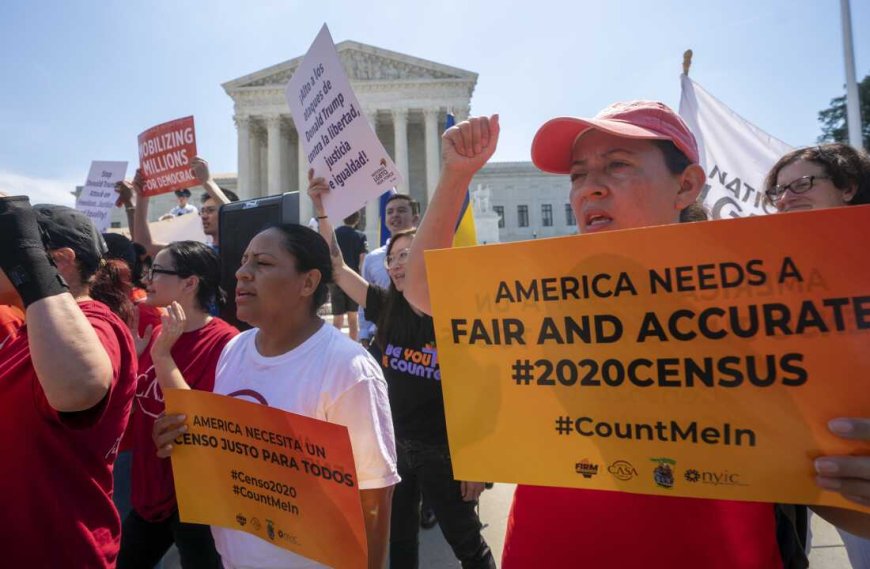Trump Pushes for New 2025 Census to Exclude Undocumented Immigrants, Sparking Nationwide Debate
President Trump’s proposed 2025 census aims to exclude undocumented immigrants, potentially reshaping congressional districts and federal funding distribution across the U.S.

WASHINGTON, D.C. — President Donald Trump has announced plans for a fresh 2025 U.S. Census that would deliberately exclude undocumented immigrants from the official population count. The proposal, which is already igniting fierce political battles, could have sweeping consequences for congressional representation, federal funding allocation, and future redistricting maps across the nation.
According to senior White House officials, the administration aims to redefine the census methodology to count only U.S. citizens and legal residents. Critics say this change could shift political power away from states with larger immigrant populations—particularly California, New York, Texas, and Florida—and toward states with fewer undocumented residents.
A Shift With Major Political Stakes
Under the current system, the U.S. Census Bureau counts every person residing in the country, regardless of citizenship status. This approach is rooted in the Constitution’s requirement for an “actual enumeration” of the population every ten years.
Trump’s new proposal, however, marks a departure from this long-standing principle. If implemented, states with higher numbers of undocumented immigrants could lose representation in the U.S. House of Representatives and Electoral College votes, altering the political balance for years to come.
A senior adviser close to the president told The Washington Post that Trump sees the measure as part of his broader agenda to “restore fairness” in representation. Supporters argue it would prevent states from gaining extra congressional seats due to noncitizen populations.
Legal and Constitutional Challenges Loom
The move is expected to face immediate legal challenges. Constitutional scholars point to a 2019 Supreme Court ruling that blocked the Trump administration from adding a citizenship question to the 2020 census, citing insufficient justification.
“This proposal is likely to trigger the most significant census-related court battle in modern history,” said Richard Hasen, an election law expert at UCLA. “It raises both constitutional and statutory questions about the meaning of representation in a democracy.”
Advocacy groups, including the American Civil Liberties Union (ACLU), have already vowed to sue. “Every person counts. That’s not just a moral principle—it’s the law,” said Dale Ho, director of the ACLU’s Voting Rights Project, in a statement to Reuters.
Impact on Federal Funding
Beyond politics, the census plays a critical role in how over $2 trillion in federal funds are distributed annually. An exclusion of undocumented immigrants could lead to substantial budget cuts for states and cities that rely heavily on federal support for healthcare, education, and infrastructure programs.
For example, school districts in immigrant-heavy areas could receive less funding for public education, while healthcare providers could see reductions in Medicaid allocations. Experts warn that the fallout could disproportionately affect urban centers, further deepening economic and social divides.
State Reactions Vary Sharply
Republican-led states are largely backing the proposal, arguing it will ensure fairer political representation and prevent the “inflation” of population counts in certain regions.
Meanwhile, Democratic-led states are mobilizing to oppose the plan, with some governors pledging to take the fight to the Supreme Court if necessary. “This is an attack on our democracy and an attack on our communities,” said New York Governor Kathy Hochul in a press briefing.
What Comes Next
The Trump administration is expected to release a detailed framework for the 2025 census in the coming months. Congress may also weigh in, particularly if lawmakers seek to limit executive authority over the census process.
With the next presidential election cycle already underway, the proposal has become another flashpoint in the ongoing national debate over immigration, representation, and the very definition of who counts as part of the American population.
As the legal battles and political fights intensify, one thing is certain: the 2025 census could become a defining moment in the Trump presidency and a turning point in the history of American democracy.











